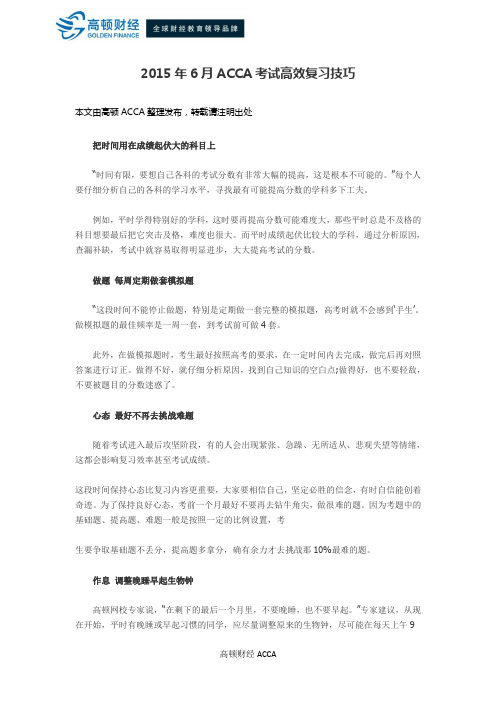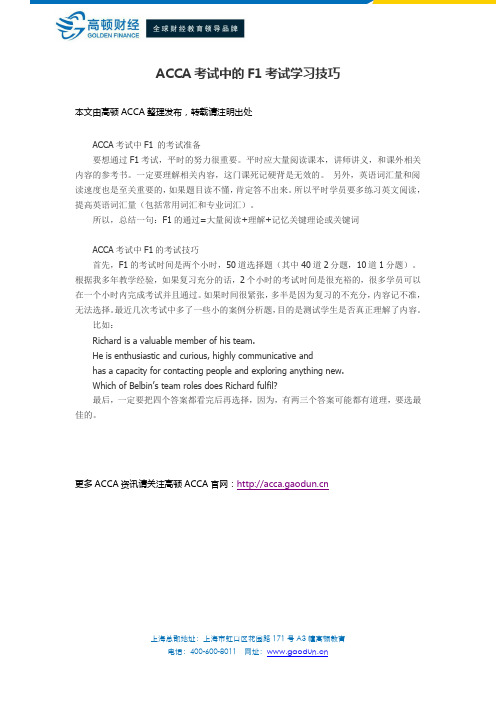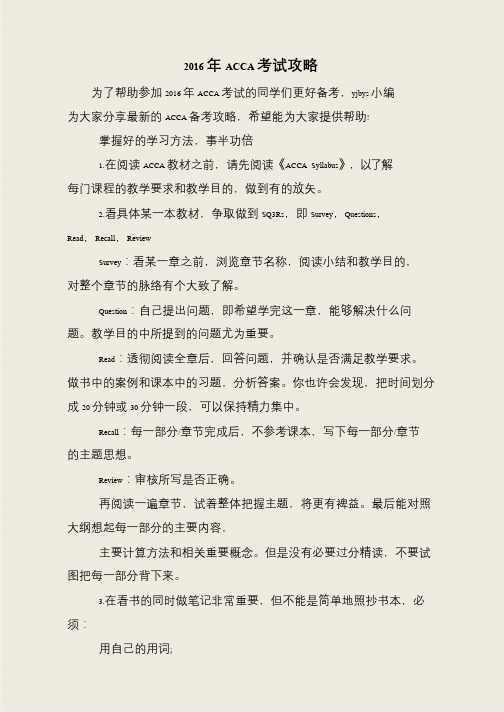2015-2016ACCA 考季F1备考全攻略
- 格式:doc
- 大小:190.50 KB
- 文档页数:3

2015年6月ACCA考试高效复习技巧本文由高顿ACCA整理发布,转载请注明出处把时间用在成绩起伏大的科目上“时间有限,要想自己各科的考试分数有非常大幅的提高,这是根本不可能的。
”每个人要仔细分析自己的各科的学习水平,寻找最有可能提高分数的学科多下工夫。
例如,平时学得特别好的学科,这时要再提高分数可能难度大,那些平时总是不及格的科目想要最后把它突击及格,难度也很大。
而平时成绩起伏比较大的学科,通过分析原因,查漏补缺,考试中就容易取得明显进步,大大提高考试的分数。
做题每周定期做套模拟题“这段时间不能停止做题,特别是定期做一套完整的模拟题,高考时就不会感到‘手生’。
做模拟题的最佳频率是一周一套,到考试前可做4套。
此外,在做模拟题时,考生最好按照高考的要求,在一定时间内去完成,做完后再对照答案进行订正。
做得不好,就仔细分析原因,找到自己知识的空白点;做得好,也不要轻敌,不要被题目的分数迷惑了。
心态最好不再去挑战难题随着考试进入最后攻坚阶段,有的人会出现紧张、急躁、无所适从、悲观失望等情绪,这都会影响复习效率甚至考试成绩。
这段时间保持心态比复习内容更重要,大家要相信自己,坚定必胜的信念,有时自信能创着奇迹。
为了保持良好心态,考前一个月最好不要再去钻牛角尖,做很难的题。
因为考题中的基础题、提高题、难题一般是按照一定的比例设置,考生要争取基础题不丢分,提高题多拿分,确有余力才去挑战那10%最难的题。
作息调整晚睡早起生物钟高顿网校专家说,“在剩下的最后一个月里,不要晚睡,也不要早起。
”专家建议,从现在开始,平时有晚睡或早起习惯的同学,应尽量调整原来的生物钟,尽可能在每天上午9点~11点和下午3点~5点,让自己的兴奋点达到高峰,保持最佳精神状态。
同时,尽量按照高考考试时间安排做模拟题的科目,使自己在考试时段里,适应各学科的考试规律。
训练强化书写和答题规范试卷的书写非常重要,但有的同学平时书写潦草,把文字或数字写得很难分清,有的同学在答题书写时步骤不规范,有的同学将答题时将答案写出答题框之外……这些小细节都可能导致不必要的失分。

上海总部地址:上海市虹口区花园路171号A3幢高顿教育电话:400-600-8011 网址:ACCA 考试中的F1考试学习技巧本文由高顿ACCA 整理发布,转载请注明出处 ACCA 考试中F1 的考试准备要想通过F1考试,平时的努力很重要。
平时应大量阅读课本,讲师讲义,和课外相关内容的参考书。
一定要理解相关内容,这门课死记硬背是无效的。
另外,英语词汇量和阅读速度也是至关重要的,如果题目读不懂,肯定答不出来。
所以平时学员要多练习英文阅读,提高英语词汇量(包括常用词汇和专业词汇)。
所以,总结一句:F1的通过=大量阅读+理解+记忆关键理论或关键词ACCA 考试中F1的考试技巧首先,F1的考试时间是两个小时,50道选择题(其中40道2分题,10道1分题)。
根据我多年教学经验,如果复习充分的话,2个小时的考试时间是很充裕的,很多学员可以在一个小时内完成考试并且通过。
如果时间很紧张,多半是因为复习的不充分,内容记不准,无法选择。
最近几次考试中多了一些小的案例分析题,目的是测试学生是否真正理解了内容。
比如:Richard is a valuable member of his team.He is enthusiastic and curious, highly communicative andhas a capacity for contacting people and exploring anything new.Which of Belbin’s team roles does Richard fulfil?最后,一定要把四个答案都看完后再选择,因为,有两三个答案可能都有道理,要选最佳的。
更多ACCA 资讯请关注高顿ACCA 官网:。

对于很多小伙伴来讲,F1阶段的考试属于基础性质的考试。
但是有很多的知识点是需要进行复习的。
下面中公财经小编给大家整理了一些重点的知识点,供大家在考试的时候进行复习。
Price theory:价格理论Price theory is concerned with how market pieces for goods are arrived at through the interaction of demand and supply.在完全竞争市场中,市场可以通过自己的调整达到均衡价格,并不需要人为的干预,比如某时刻市场的价格高于了均衡价格,就会导致消费者嫌贵,不愿意买,供应商因为价格高而愿意卖,市场出现供给大于需求的情况,这种情况不会长久,因为长时间没人买,商品就要降价,使得商品价格降回均衡价格,反之亦然,这就是Price mechanism 价格机制的调节,它使市场价格围绕均衡价格上下波动,所以价格机制在一定程度上是可以通过对供求的调节分配市场资源的。
Aggregate supply:社会总供给Aggregate demand:社会总需求【注意】:aggregate 是在宏观经济中才会出现的概念,是指社会每个单独经济体(个人或是组织)供给或需求的总和;总需求是由consumption 消费, investment 投资, government spending 政府支出, exports minus imports 净出口这四个部分构成的。
因此我们说的拉动需求,刺激经济一般都是通过扩张型的财政或货币政策来影响这四个构成部分,比如通过财政政策增大政府支出,或通过货币政策,调节利率来刺激投资和消费,这些通过影响需求来影响经济产出的政策就是我们说的demand side policy,需求则政策;当AD>AS 时,会产生inflationary gap (通货膨胀缺口),这时社会达到充分就业的状态,资源被充分利用了,可以说总供给已经没有上升的空间了,因此这时需求的增加不会再带动供给的增加,而会导致物价的上涨,进一步引发通货膨胀;Sustainability:可持续发展Using resources in such a way that do not compromise the needs of future generations.既满足当代人的需求,又不损害后代人满足其需求的发展。

ACCA考试F1-F3备考攻略一、考试形式F1-F3机考的特点是题型灵活多变,有主观题和客观题,还有案例分析题,需要考生在理解的基础上灵活运用。
二、备考策略1. 制定合理的学习计划考生需要根据自身情况,合理安排每天的学习任务,比如每天做题、听网课、背诵知识点等。
同时要预留出足够的时间进行真题和模拟题的练习。
2. 基础阶段:先学知识,再练技能在学习F1-F3的过程中,要先学习知识,将知识点理解清楚,然后再进行相关的技能练习。
在练习的过程中,要注意错题的总结,查漏补缺,巩固知识。
3. 提高阶段:刷题为主,知识为辅在刷题的过程中,要结合知识进行理解,加深对知识点的理解。
同时,要注重做题速度和准确率的提高。
4. 冲刺阶段:模拟考试,查漏补缺在模拟考试的过程中,要注意时间的把握,模拟真实考场环境。
同时,要认真分析错题,找出自己的不足之处,及时进行补充学习。
三、备考建议1. 针对不同科目特点进行针对性学习。
例如,F1以知识点的背诵为主,F2以客观题为主,F3主观题为主。
2. 重视真题和模拟题练习。
真题和模拟题是了解考试形式和内容的重要途径,可以帮助考生把握考试重点和难点。
3. 制定合理的学习计划,保持每天的学习节奏。
在学习过程中,要时刻提醒自己学习计划的重要性,合理分配时间。
4. 多听名师课程,寻找学习伙伴互相交流、探讨、解决问题。
这样可以更全面地掌握知识,还可以增强自信心。
5. 在备考过程中要注意时间的分配,尤其是到了最后冲刺阶段,合理规划时间至关重要。
此外,还需要不断地反思总结,发现自己的不足之处并进行弥补。

2015ACCA考试F1-会计师与企业知识点讲义(1)Chapter 1The business organisationChapter learning objectivesUpon completion of this chapter you will be able to:§define the term organisation§explain the need for a formal organisation§distinguish between different types of organisation§summarise the main areas of responsibility for different functions within an organisation§explain how different departments co-ordinate their activities§explain the nature and process of strategic planning§explain the purpose of each level of organizational management.1 The nature of organisations1.1 What is an organisation?‘Organisations are social arrangements for the controlled performance of collective goals.’(Buchanan and Huczynski)The key aspects of this definition are as follows:§collective goals§social arrangements§controlled performance.Expandable textAs yet there is no widely accepted definition of an organisation. This is because the term can be used broadly in two ways:§It can refer to a group or institution arranged for efficient work. To organise implies that there is an arrangement of parts or elements that produces more than a random collection.§Organisation can also refer to a process, i.e. structuring and arranging the activities of the enterprise or institution to achieve the stated objectives. The very work organisation implies that there is order or structure.There are many types of organisations, which are set up to serve a number of different purpose and to meet a variety of needs. They include:§service companies§factories§retail companies§political parties§charities§local councils§the army, navy and air force§schools.What they all have in common in summarised in the definition given by Buchanan and Huczynski:‘Organisations are social arrangements for the controlled performance of collective goals.’(a) ‘Collective goals’–organisations are defined primarily by their goals. A school has the main goal of educating pupils and will be organised differently from a company where the main objective is to make profits.(b) ‘Social arrangements’–someone working on his own does not constitute an organisation. Organisations have structure to enable people to work together towards the common goals. Larger organisations tend to have more formal structures in place but even small organisations will divide up responsibilities between the people concerned.(c) ‘Controlled performance’–organisations have systems and procedures to ensure that goals are achieved. These could vary from ad-hoc informal reviews to complex weekly targets andperformance review.For example, a football team can be described as an organisation because:§It has a number of players who have come together to play a game.§The team has an objective (to score more goals than its opponent).§To do their job properly, the members have to maintain an internal system of control to get the team to work together. In training they work out tactics so that in play they can rely on the ball being passed to those who can score goals.§Each member of the team is part of the organisational structure and is skilled in a different task; the goalkeeper has more experience in stopping goals being scored than those in the forward line of the team.§In addition, there must be team spirit, so that everyone works together. Players are encouraged to do their best, both on and off the field.Test your understanding 1Which of the following would be considered to be an organisation?(i) A sole trader(ii) A tennis club(iii) A hospitalA) (i), (ii) and (iii)B) (i) and (ii) onlyC) (ii) and (iii) onlyD) (i) and (iii) only。

2016 年ACCA 考试攻略
为了帮助参加2016 年ACCA 考试的同学们更好备考,yjbys 小编
为大家分享最新的ACCA 备考攻略,希望能为大家提供帮助!
掌握好的学习方法,事半功倍
1.在阅读ACCA 教材之前,请先阅读《ACCA Syllabus》,以了解每门课程的教学要求和教学目的,做到有的放矢。
2.看具体某一本教材,争取做到SQ3Rs,即Survey,Questions,Read,Recall,Review
Survey:看某一章之前,浏览章节名称,阅读小结和教学目的,对整个章节的脉络有个大致了解。
Question:自己提出问题,即希望学完这一章,能够解决什么问题。
教学目的中所提到的问题尤为重要。
Read:透彻阅读全章后,回答问题,并确认是否满足教学要求。
做书中的案例和课本中的习题,分析答案。
你也许会发现,把时间划分
成20 分钟或30 分钟一段,可以保持精力集中。
Recall:每一部分/章节完成后,不参考课本,写下每一部分/章节的主题思想。
Review:审核所写是否正确。
再阅读一遍章节,试着整体把握主题,将更有裨益。
最后能对照
大纲想起每一部分的主要内容,
主要计算方法和相关重要概念。
但是没有必要过分精读,不要试
图把每一部分背下来。
3.在看书的同时做笔记非常重要,但不能是简单地照抄书本,必须:
用自己的用词;。
2015年12月ACCA考试P1考前tipsEach P1 paper offers 4-6 marks for displaying professional skills, which can easily be the difference between a pass and a fail. The marks are available for both format and the tone and style of your answer, where you may have to prepare a speech or write a letter on behalf of the Board addressing specific concerns. Take a look at the Article of 24 August 2009 for more guidance and some great hints on style.P1 is a very wordy paper, and the examiner wants to ensure that you have a good grasp of the theories behind the questions, but also that you can successfully apply the theories to given scenarios. Therefore, it is very easy to get lost within a question if your layout and approach to a question is poor.A good approach is to apply 3 rules in your answer:Introduction – this should be very short, but can help you get over any ‘writers block’. It might include a read back of the question, or a definition of the subject matter (for example, if the question asks for the roles of NED’s, start by very quickly defining what an NED is)Theory – this section will show the examiner that you actually understand the issue being questioned, again, as with the introduction, this should really be kept short, it can be a section quote from the code, or a reference to an author (Cadbury or Greenbury et al).Application – This will be the main bulk of your answer and should relate directly to the scenario. This is often the most difficult section of the answer, but should be made easier by the use of the introduction and theory sections.In addition remember the golden rules of written questions:Plenty of white spaceHeadings as requiredShort punchy meaningful paragraphsFollowing are some of the famous topics that were tested in pastCorporate governance critique and improvements.Effective internal control systems, reporting within differing jurisdictions.Influence of and intervention by institutional investors.Diversification of BoardFunction and importance of internal audit.Risk definition, analysis of risk and the role of the Board of Directors.Risk correlation and strategies for management of such risks.Ethical standpoints and their application to business decisions.Corporate codes of ethics critique and improvements.Tucker’s ethical decision making model.Social and environmental footprint.Sustainability accounting.Integrated ReportingConflict of interest and independenceCorporate Social Responsibility (CSR)。
2016年6月份ACCA考试备考攻略
怎么备考有助于顺利通过考试?
你是不是每次考试前不管看了多少遍书都没信心?给自己的考试科目梳理一个知识框架吧!
具体的做法如下:
第一点:从书本中的各个Chapter中,找出它们互相之间的联系,把他们总结到一起。
比如一个大括号里包含1和2,1和2就是你的章节概述,然后就可以把1或者2展开,把总结出的SYLLABUS放在1或者2里,以此类推,把这个框架作为你的Study Guide,你就可以抛开书本,节约很多复习时间哟!
第二点:把重要的知识点整理到一个本子上进行滚动复习,每天背整理的知识点,一次时间不要超过20分钟,争取每天多看几次,随着对内容的熟悉,对知识点的把控就越好。
第三点:如果你能把手里练习题的2/3做好,基本就可以认为你有百分之80
的几率通过ACCA考试哟!如果能够对同一重点的不同类型的考题都比较熟悉答案思路,还有什么可怕的?同理,你需要做的就是针对重点,把历年考题中涉及过该重点的题目筛选出来,重点攻克!
注意:这里有一点想要请大家注意,因为英国判卷重在理解,所以财萃小编的建议是大家可以采用理解记忆的方式去完成一些需要记忆的内容,只要理解的正确,能够顺利的叙述出来你的答案就好!
提示:考试成绩取决于掌握知识和技能的多少,而不在于看书的多少,不要把复习限制于书本,多种方式进行备考能拿到更大的胜算哟!。
2016年ACCA考试《F1会计师与企业》知识点预习(1) ABC Co has a system which records details of orders received and goods dispatched,invoices customers and allocates remittances to customers. What type of system is this?A Management information systemB Decision support systemC Knowledge management systemD Transaction processing systemEven a casual reading of the question will highlight that the word 'system' is a key word. It is used in the stem (the initial statement which describes the system), the prompt (the actual question) and in each of the choices.This means that unless care is taken to read the question and think carefully about what is being asked, it would be easy to become confused. A further problem is that all four of the systems in the choices are examples of systems that might be utilised in an organisation. To select the correct answer, the best approach is to consider what each of the four systems is intended to achieve.A management information system is intended to provide information to managers. Information is processed data, which is useful for making decisions. In this case, the stem refers to data (as it is unprocessed - information would not be an individual order,but the total value of orders for a particular product or from a specific customer). Therefore, A is not correct.A decision support system is intended to do exactly what the name suggests - provide information to assist managers to make decisions. Once again the system relates to information. As we have already decided that the stem refers to data,B cannot be the correct answer.Choice C presents a potential problem. A knowledge management system is intended to create, capture, store and share information. The stem notes that the system 'records details of orders' (capture) and invoices customers (creates). This may create confusion for the ill-prepared candidate. However, a well-prepared candidate will note that, once again, the issue is that 'infor。
ACCA考试技巧F1如何准备知识模块考试本文确定一些关键步骤准备知识模块考试并简要讨论了广泛的ACCA网站可用资源,为学生提供指导,ACCA资格的知识模块考试都是评估使用短的问题,被称为客观问题。
这是为了确保审查员能够评估广泛在时间允许他们的教学大纲。
所有三个考试包含50个问题,及格分数是50%。
两个小时的考试有时间限制。
这个结构是基于相同的纸和计算机考试(cbe)。
准备知识模块考试可以说是要求一个不同的策略,当准备考试需要更长时间的答案。
在纸质考试,所有问题是多项选择,包括两个,三个,四个答案选项。
cbe覆盖相同的教学大纲地区纸质考试但包括更广泛的问题,稍后将在本文中描述。
在纸质考试,可以值得一个或两个标志的问题。
准备知识模块考试,学生应该遵循一套合乎逻辑的步骤:1开始学习指南总是先学习指南。
这是源文档,在准备考试的考官的工作和基于CBE问题的银行。
使用学习指南要熟悉教学大纲的主要部分,并在这些部分与主题领域。
考试结构允许考官问50的问题,而这些问题是来自所有课程领域,你必须确保你完全了解尽可能多的地区。
2阅读官方的教科书ACCA的批准内容提供商贝克专业教育,BPP学习媒体和卡普兰出版。
他们生产的研究旨在支持ACCA研究和发表文字专门为ACCA留学生对知识模块考试,因此尽可能涵盖教学大纲。
这些文本包括造型的测试知识和实践问题以及试题风格问题。
的文献综述了考官每年以确保覆盖适合考试。
学生使用官方文本应该确保他们彻底阅读以获得一个适当的接地考试所需要的知识,并帮助他们运用知识考试的问题。
除了研究文本,这些出版商也提供各种复习资料,包括实践问题,帮助你强化和测量的理解教学大纲。
3认识到问题类型在cbe,采用多种形式客观问题:多项选择题(MCQ)候选人从两个选择正确答案,三个或四个备选方案。
注意,如果有四个选择,问题将会吸引两个标志; 如果有更少的选择,那么只有一个马克。
真或假(TF)——这些问题作为MCQ有相同的结构,但只有两种选择,所以总是值得只有一个马克。
2015-2016ACCA 考季F1备考全攻略
F1考官Bob Souster介绍:
Bob runs a successful education and trainign partnership.
His previous background is in banking and he was
divisional manager of a large financial institution.
Bob also has many years of lecturing experience globally,
specializing in teaching a variety of law and management subjects.
F1课程目的:
To develop knowledge and understanding of the business
environment and the influencethis has on
how organisations and accountants operate,
and of the role of the accountant
and other key business functions in contributing to an efficient,
effective and ethical organisation,
and to build knowledge and understanding of the
basic principles of effective management.
F1的内容:
F1这门课的内容很杂,主要涉及到以下三门主要学科:组织行为学,人力资源管理,会计和审计。
其中F1内组织行为学的内容包括:组织结构,个体,群体,团队管理,组织文化,管理原理和领导理论,激励理论,和沟通原理等,人力资源管理方面内容包括:招聘选拔,公平工作机会和多样化员工管理,员工培训和开发,绩效考评,和工作健康和安全等,会计和审计方面内容包括:会计职能,内审外审,内部控制,公司治理,和欺诈等。
除了这三门主要学科外,F1还涉及到经济学,市场学,战略管理,职业道德,信息管理和时间管理等内容。
The F1 syllabus is broad and demands a knowledge and comprehension of
concepts relating to organizations and management as well as basic accounting
functions and activities.
虽然F1的内容包罗万象,但根据大纲要求它只属于Fundamental Level,所以只是basic understanding 就好,并不需要应用。
F1要求学生学习时一定要通看课本和老师讲义,而且应该做大量阅读,注意广度,以理解为主,不要对某方面知识死钻牛角尖。
F1的学习绝对不可猜题,复习时也绝对不可有遗漏或空白。
Achieving a pass in F1 requires a broad-
based approach, balancing the need to cover all areas of syllabus
without necessarily having to expore individual topics in any great depth.
The deeper understanding is tested at the higher levels of the ACCA
qualification in papers such as P3.
F1 的考试准备
要想通过F1考试,平时的努力很重要。
平时应大量阅读课本,讲师讲义,和课外相关内容的参考书。
一定要理解相关内容,这门课死记硬背是无效的。
另外,英语词汇量和阅读速度也是至关重要的,如果题目读不懂,肯定答不出来。
所以平时学员要多练习英文阅读,提高英语词汇量(包括常用词汇和专业词汇)。
所以,总结一句:F1的通过=大量阅读+理解+记忆关键理论或关键词
F1的考试技巧
首先,F1的考试时间是两个小时,50道选择题(其中40道2分题,10道1分题)。
根据我多年教学经验,如果复习充分的话,2个小时的考试时间是很充裕的,很多学员可以在一个小时内完成考试并且通过。
如果时间很紧张,多半是因为复习的不充分,内容记不准,无法选择。
最近几次考试中多了一些小的案例分析题,目的是测试学生是否真正理解了内容。
比如:
Richard is a valuable member of his team.
He is enthusiastic and curious, highly communicative and
has a capacity for contacting people and exploring anything new.
最后,一定要把四个答案都看完后再选择,因为,有两三个答案可能都有道理,要选最
佳的。